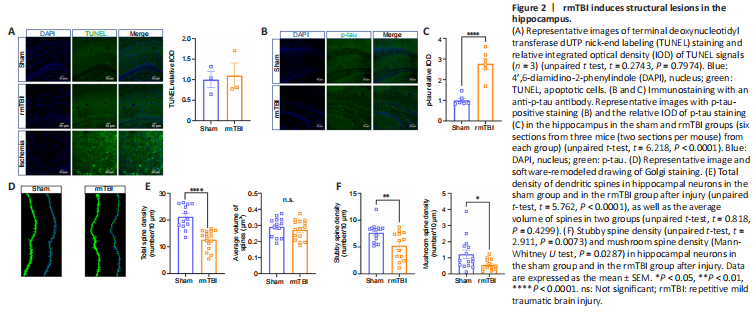脑损伤
-
Figure 2| rmTBI induces structural lesions in the hippocampus.

Next, to clarify whether the observed neurological impairments were associated with damage to specific brain regions, we detected apoptotic neurons by TUNEL staining and phosphorylated microtubule-associated protein tau (p-tau) expression by immunofluorescence. Based on previous studies, cognitive impairment, such as reduced learning and memory capacity, is closely associated with structural damage to the hippocampus (Anacker and Hen, 2017; Lieberman et al., 2019; Xu et al., 2019). Therefore, we focused on histological alterations in the hippocampus after rmTBI. There was no significant difference in TUNEL staining of cellular bodies in the hippocampus of the rmTBI group compared with the sham group; tissue sections from a mouse with acute brain injury (3rd day of brain ischemia) were used as a positive control (Figure 2A). The hippocampus of the rmTBI group exhibited more positive staining for p-tau than the sham group (Figure 2B), and the relative integrated optical density (IOD) of p-tau was significantly different between the sham group and the rmTBI group (P < 0.0001; Figure 2C).
To determine whether synaptic connections and plasticity were altered in the hippocampus after rmTBI, we conducted Golgi staining to observe neuronal dendrites and dendritic spines. The total density of dendritic spines in hippocampal neurons in the rmTBI group was significantly lower than that in the sham group (P < 0.0001), but there was no significant difference in the average volume of spines between the two groups (Figure 2E). The densities of stubby spines (P = 0.0073) and mushroom spines (P = 0.0287) were significantly lower in the rmTBI group than in the sham group (Figure 2F). A representative image and software-remodeled drawings are shown in Figure 2D. These results demonstrated that rmTBI mainly causes neurodegeneration in brain tissue at the chronic stage, which differs from the apoptosis caused by acute brain injury. The neurodegeneration that occurs in the hippocampus could explain the neurological impairment observed after rmTBI.